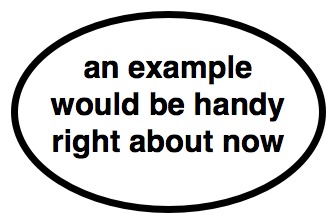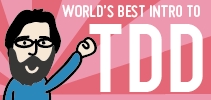Ignore This Article At Your Peril: You'll Miss a Great Learning Opportunity!
Absolute, or universal, claims make for easy targets: a single counterexample causes them to tumble to the ground. Worse, when your interlocutor defends his claim in spite of your counterexample, then you likely end up in a meta-argument about logic that ends up far afield of the original point. It entertains, but it doesn’t inform. I have made this mistake several times in the past, so I plan to work on that, and I wanted to alert you to the possibility that you could benefit from working on it, too. Accordingly…
Whenever I hear someone make an absolute statement, rather than look for counterexamples or dismiss it out of hand, I will simply substitute a relative one in my head, and look for a way to make the information truly useful.
I must admit to having a serious stickler streak, and I’ve decided to work on that over the past few years. I have chosen to change this about myself because I found that people interpreted my practical desire for precision as insulting pedantry. Recently, I’ve noticed a big uptick in my intolerance of absolute statements, preferring instead to carefully label opinion as opinion. Unfortunately, while I felt I was making “carefully” the operative word in that last sentence, it turns out that most people mostly noticed the intolerance. I plan to do something about this, and I wanted to share that with you, in case you found it useful, too.
Now I can sense what you’re thinking…

Recently, I saw Robert Lustig’s talk Sugar: the Bitter Truth. In it, he claims that fructose poisons the human body just the way ethanol does. He calls fructose “alcohol without the buzz”. Now this matches my experience, because I have lost 60 pounds twice in my life, both times by drastically reducing sugar and starch in my diet. Each time, when I reintroduced sugar into my diet, I gained all the weight back, and with a vengeance. But when I started to tweet about it, people began to tweet opposite points of view at me. (I like that: if you want to test an idea, tweet it.) This made me question what I’d just seen, even though it matched my experience. I didn’t relish the thought of wading through all the nasty commentary on the web, trying to pick out which “facts” I could trust and which opinions I ought to believe. After all, I had just decided only a few weeks ago to reduce sugar in my daily diet, and felt good about the change. Did I really have to completely rethink this?
And then it hit me: we don’t need to demand a single solution here.
Don’t Discount n=1 Entirely
I have some reasonable observational evidence that sugar makes me fat. I can’t do a clinical study on myself, so I have to make this evidence work. Now we know that observational evidence only shows linkages, not causation, so I can only conclude that something I do while drastically reducing sugar from my diet helps me lose weight. I don’t know what, although I don’t think exercise explains it, because I don’t exercise much in general, low-sugar diet or not. (Lustig’s statement about conclusions from observation evidence will likely provide the most value to me from his talk.) How can I make use of this information?
I plan to continue to eat in the Four-Hour Body style with very limited sugar intake six days per week and unlimited sugar intake on the seventh day. I will monitor my weight and my feelings about eating using mercuryapp. I doubt that reducing sugar intake will hurt me, so I feel comfortable experiment for another six weeks and looking at the data then. From this informal auto-observational study, I plan to decide whether reducing sugar intake has somehow helped. I then plan to reintroduce whole fruit into my diet for one month to observe its influence. I then plan to reintroduce potatoes and root vegetables into my diet to observe its influence. Finally, I plan to reintroduce bread and rice into my diet to observe its influence. At the end of six months, I ought to have some idea what sugar does to me.
What Do You Really Want To Know?
Will I know definitively that fructose is a toxin? No. I don’t need to make the kind of far-reaching absolute claim that Lustig has chosen to make. I only need to know whether I can use the information in his talk to improve my health. I’ll try that, and if that fails, then I’ll go back to the drawing board. Rather than having wasted energy learning the absolute truth—as if it existed—I’ll have turned a contentious absolute statement into information I can use for my own benefit, and all that without leaving frustrated comments on Lustig’s video, his web site, or trying to change his mind. I imagine I’ll see better results that way.
You might, too. Have you tried this yourself? What did you learn? Do you want to try this? Why? Do you think I’ve lost my mind? I’d like to know that, too. Please share your thoughts in the comments section.
Five Years Later…
It took less than four years to lose a little over half my peak body mass. I dropped from about 315-320 pounds (143-145 kg) to as low 152 pounds (69 kg) and for more than one year now my weight has hovered around 160 pounds (72.5 kg). Whatever I did, it seems to have got me where I wanted to go.
Of course, I can’t be sure how much of this change to attribute to any things that I did, but now that I have almost five years of data, I can tell you this: I eat more sugar, I gain weight; I eat less sugar, I lose weight. I really don’t mind if other people lose weight with different techniques; I really don’t mind if other people find it too difficult to lose weight the way I did. I don’t care about whether “it works”. In this particular case, “it worked on my machine” was good enough for me.
With my weight under control, I now find it easy to eat more sugar for a short period of time without worry, watch my weight elevate a little, then cut back on the sugar and watch my weight decrease. (This came in handy on a recent seven-day cruise in the Caribbean. I’m recovering now.)
Maybe the most important thing I discovered with this experiment: most sugar does trigger extra feelings of hunger in me, which encourages me to eat more than I otherwise would. As long as I don’t let eating more sugar become a habit, I will avoid regaining all the weight that I spent over three years losing. Toxin or no, that’s information of significant practical value to me—enough to consider the experiment highly successful.
Three Years Laterer…
I spent a week in Zürich, which I love, but where they very much like to eat bread. I ate bread. I really like bread. In five days I noticed a difference in my weight. In five days. I otherwise had low stress, walked about 30 minutes per day, and kept busy. I drank a lot of water. I did the other things well, but I noticed an immediate change in my desire to eat sugar. I can’t deny it any more: eating sugar makes me want to eat sugar, and eating sugar makes me more fat, so I will always need to artificially limit my access to it. Good enough for me. The first part of 2019 will include focus on losing this weight by getting back to habits that work for me.


